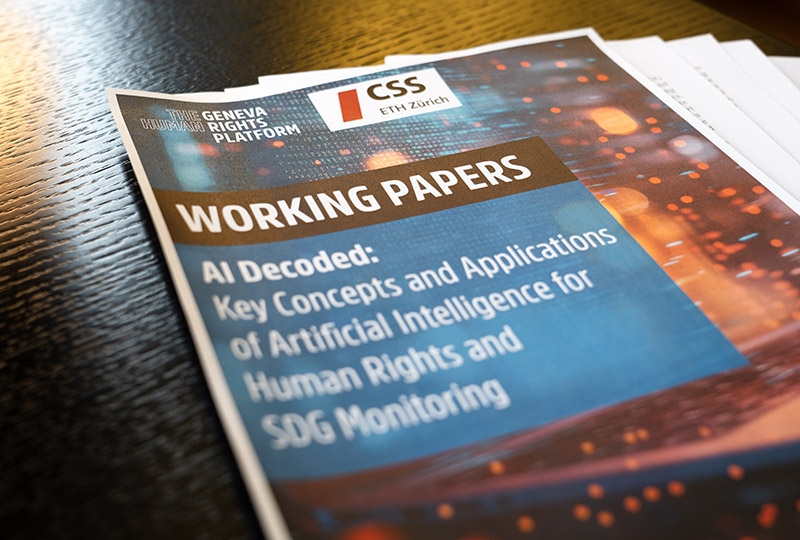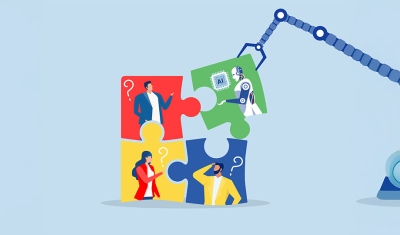30 January 2025
The field of human rights and SDG monitoring has been transformed in recent years by the introduction of digital tracking tools and databases. The rapid advancement of Artificial Intelligence (AI) and Machine Learning (ML) presents new opportunities to further strengthen these efforts. While AI has already demonstrated its potential for social good in various policy fields, its role in human rights monitoring remains underexplored.
Our new GHRP working paper, AI Decoded: Key Concepts and Applications of Artificial Intelligence for Human Rights and SDG Monitoring, co-authored by Milica Mirković, Research Consultant at the Geneva Human Rights Platform, and Jennifer Victoria Scurrell, PhD Candidate at the Center for Security Studies (CSS) at ETH Zurich, seeks to bridge this gap by examining how AI can contribute to these areas. The paper introduces key AI and ML concepts, offering a clear understanding of their functions and applications. It explores AI’s role in advancing social good and highlights how its analytical capabilities can improve SDG monitoring and human rights tracking, ultimately fostering accountability and evidence-based policymaking.
'Leveraging AI for human rights and sustainable development work is no longer a question of possibility but of responsibility,' notes Milica Mirković. 'AI can enhance data-driven decision-making, improve accountability, and increase the accessibility of human rights monitoring. However, ensuring ethical implementation and interoperability remains key to maximizing its impact.' This perspective underscores the paper’s emphasis on AI’s potential to revolutionize data collection and analysis in human rights monitoring, while also recognizing the challenges that need to be addressed.
At the same time, the ethical risks of AI in monitoring systems—such as bias, privacy concerns, and transparency issues—cannot be overlooked. As Jennifer Victoria Scurrell points out, 'While AI presents new opportunities for human rights monitoring, it also introduces critical ethical dilemmas. Issues like bias, data privacy, and the opacity of decision-making processes need urgent attention to ensure that AI strengthens – rather than undermines – human rights protections.' The paper explores these challenges in depth, emphasizing the need for robust governance frameworks and ethical safeguards to ensure AI is used responsibly.
The publication is designed as a practical resource for professionals working at the intersection of technology, human rights, and sustainable development. Domenico Zipoli, Project Coordinator at the Geneva Human Rights Platform, highlights its significance: 'This working paper is an invaluable tool for human rights and sustainable development professionals, as it bridges technical and policy-making expertise. It represents a unique opportunity for collaboration between two leading institutions in the field of computer sciences and human rights policy.' By equipping practitioners with foundational AI knowledge, the paper aims to break down silos and foster interdisciplinary collaboration.
Looking ahead, the role of AI in this rapidly evolving field will only continue to grow. Felix Kirchmeier, Executive Director at the Geneva Human Rights Platform, reflects on the pace of change: 'The challenge now is not just about keeping up with AI advancements but shaping the ethical and regulatory frameworks that ensure AI serves as a force for good. A crucial aspect of this is equipping human rights professionals with the necessary skills to engage meaningfully with AI-driven monitoring tools. This is why the GHRP is committed to deploying specialized training within the newly established AI Skills Coalition, as part of ITU’s AI for Good initiative. By strengthening AI literacy and fostering practical capabilities, we can ensure that the human rights community is not only adapting to AI but actively shaping its responsible use.'
In an era where AI and ML are reshaping data collection, analysis, and governance across numerous fields, this paper provides a much-needed bridge between the technical and policy-making communities. By outlining key AI concepts and discussing their applications and limitations, it empowers professionals to make informed decisions about AI’s role in human rights and sustainable development governance.











